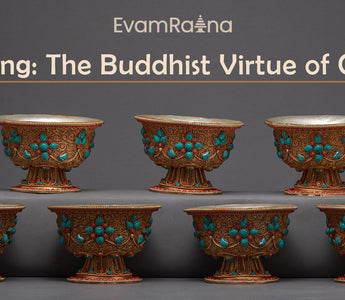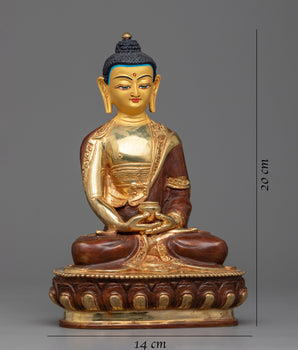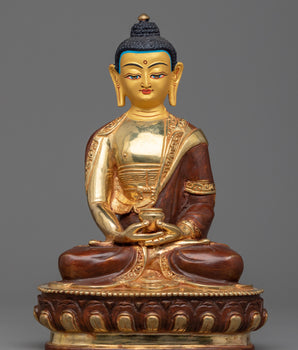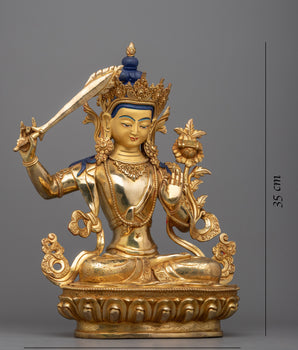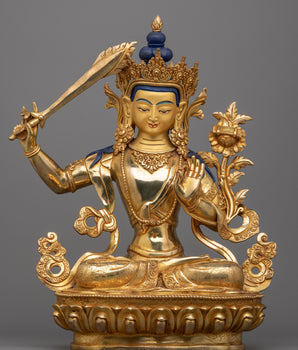Offering: An Act of Generosity
Are you familiar with the feeling of joy we feel when our hearts are open and we want to share with others? This is the result of practicing generosity. Offerings are a formal religious expression of the basic Buddhist virtues of giving. Because of the progressions from our perspective that happen when we offer something, we create positive opportunities (or good karma) that will bring about future happiness. The act of offering is an act of generosity.
What offerings do we make to the Buddha?
Traditionally, people offer water, flowers, incense, light, food, perfume, and music. Some people also offer crystals, jewelry, and prayer beads. Most significantly, in Tibetan tradition, we can see the offering of the seven glasses of water placed on the altar every morning.
Most of these traditional offerings have symbolic meanings such as;
- water: represents the absolute purity of the Buddhas
- flowers: represents the characteristics of Buddha and Bodhisattva
- Incense: represents the scent of pure ethics
- light: symbolizes wisdom, and perfume represents faith and trust in the sacred being
- food: represents the maintenance of meditative concentration, and music reminds us of the impermanent and empty nature of all phenomena.
In the case of an offering, the person who provides the offering will also receive what was provided. For example, providing water and flowers can bring beauty to a calm mind; burning incense helps you connect to the earth while lighting candles create enlightenment and symbolize the destruction of ignorant darkness.
When we give to a being in an equal or worse state than ourselves, we sacrifice something that belongs to us for the benefit of another. In giving to a being superior to ourselves, to our guru, a Buddha or bodhisattva, we perform an act of renunciation.
WHY MAKE OFFERINGS?
When you are making offerings to Buddha, you are making offerings to your own buddha nature, to your own capacity to awaken. The reason why we make offerings is to offer the best of ourselves to something higher than us – so that we can one day, aspire to become like them too!
A definitive thought process in giving is to achieve enlightenment to support every single conscious being. Sacrifice is a potential chance to accumulate unlimited benefits. And, you give what you can because the sincerer offerings are made, the more abundant your blessings will be by the grace of what is being offered.

So it’s an emotional and physical expression of our reverence;
- To the Buddha himself – the Enlightened One
- To the Dharma – the Truth and,
- To the Noble Enlightened Ones like the Bodhisattvas
Motivation When Making Offerings
The importance lies in the attitude with which one makes the offering to the enlightened objects of the refuge, the sources of all inspiration. You offer what you can. The ultimate motivation for giving is to generate the causes for attaining enlightenment for the welfare of all sentient beings.
Although exalted beings have no real need for our offerings, they delight in the merit of the giver, which is determined by the quality of his or her motivation. It may be possible to fool other people, pretending to be acting out of pure and exalted motivation, covering up your mundane aspirations, but it does not generate merit.
When giving to those who are suffering, we should meditate on compassion, be mindful of their miseries, and strongly wish that they be parted from them. Making offerings to wise beings such as Buddhas, bodhisattvas and spiritual masters is an occasion for faith and joy. When giving to those who help us, such as our parents or friends, we should give impartially, with equanimity, the basis for developing the awakening mind. Giving is not an opportunity to favor one being over another, for all beings are equal in wishing to be happy. Giving simply to show off and cultivate popularity or to outdo someone else will result in little merit. To give purely, we should do so joyfully without regret, with equanimity, and without expectation of any reward.
If you simplify the purposes of the foundations they could generally be categorized as:
- Creating merit
- Purifying negativities
These two aspects, the positive and negative, creating good karma, and purifying negative karma, are with the view of removing the obstacles to successful practice. To obtain realizations in our meditations, we need a calm mind, free of clinging, stress, anger, and other afflictive emotions.
Simply put, offerings give us a precious opportunity to create merit. Even if the Buddha doesn’t need incense, we need the act of offering to start to “work out” our past “selfishness.”
What to do with your mind as you make offerings??
As we are preparing the things to offer we can be remembering the qualities of the Buddha. We can think thoughts of gratitude for the great help that the Buddha has given us. We can be happy remembering that we are doing something very rare in the world that brings powerful good results into our lives.
For example, in one of his past lives, the future Buddha was Santavik, the son of a merchant. One day he noticed that the birds in the nearby cemetery were starving, and overwhelmed by compassion for them, decide to offer them his body. He lay down as if dead and soon vultures began pecking at his left eye. They were intrigued that he kept so still and paused. Santavik thought, “This body is impermanent, I have no desire for it, and giving it away is beneficial.” He encouraged the birds to eat it, and they did so without misgiving.
Anything that reflects the giver’s wish to please someone is suitable to be given. At best, a gift should be beneficial both immediately and ultimately. If it is not beneficial in the short term, but only in the long term like bitter medicine that takes some time to act, it is suitable. When something provides short-term pleasure, but ultimate damage, such as supplying an addict his drug or a drunkard his drink, it would be better to refrain from giving.
The greater the sacrifice we make, the greater the merit we create. The Buddha spent many eons accumulating limitless merit through the practice of the six perfections of giving, ethics, patience, effort, meditative stabilization, and wisdom.
Mental states to cultivate
- Happiness in making the offering
- Confidence that acts of giving create powerful good karma
- Gratitude to the Buddha and our teachers
- Recollection of the qualities of the Buddha
How to set up your own Buddhist Shrine?
- Find a clean, quiet, and uncluttered spot
- Set up an altar table, cover it with an altar cloth that calls to you
- Place your sacred item (statue, thangka, or a picture of Buddha) at the center
- Find a statue stand to keep the statue raised above the other items
- You can place your offerings of seven water bowls, candles, incense, shells, or flowers in offering bowls or incense burner or light up a butter lamp. Also, some crystals, gemstones, or mala beads.
- If you want a more elaborate altar, you can put Stupa as well.
Perhaps the most important offering that we can give to the Buddha and Bodhisattvas – the offering of our own practice. This means practicing the teachings of the Buddha – until you can get some skill until you can get some accomplishment – this way, the Buddha’s teachings will be able to bear some fruit in your own life and you may be able to benefit others.

